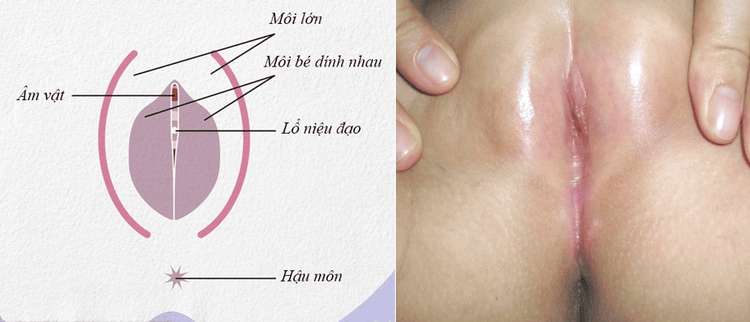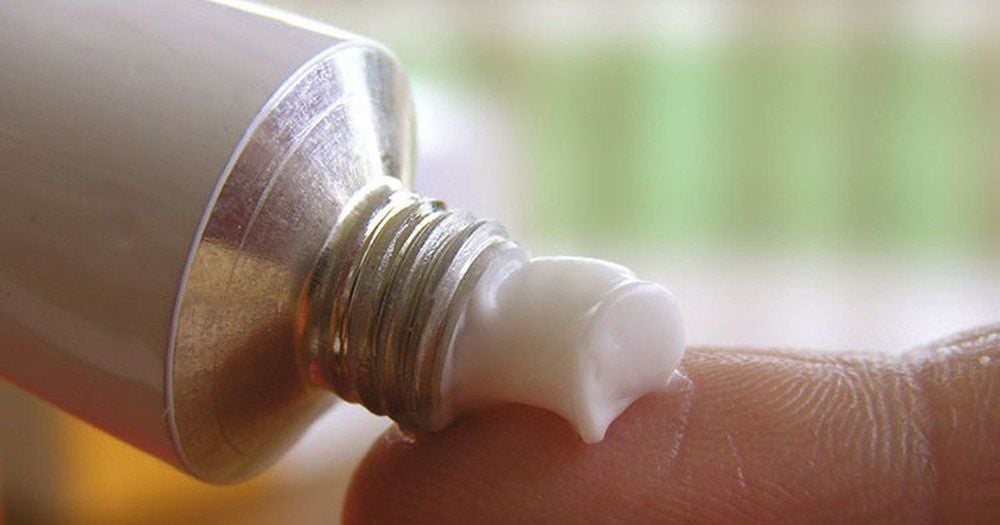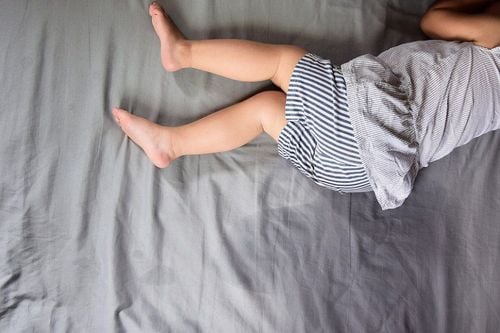This is an automatically translated article.
The article was professionally consulted by Specialist Doctor II Tran Van Trong - Specialist in Pediatric Surgery, Plastic Surgery - Aesthetics - Department of General Surgery, Vinmec Danang International HospitalSticky lips in girls will make it difficult to clean the private area, especially when the baby hits puberty. This condition can cause inflammatory diseases such as vaginitis, urinary tract infections, and can even cause infertility later in life. Therefore, when there are signs of the disease, parents need to take the child to see a pediatrician to have a timely treatment plan to avoid affecting the child's development.
1. What is a girl's lip stick?
Sticky labia in girls is a condition where the two small lips of the female external genitals stick together, causing the vaginal opening and the urinary opening to be partially covered. This condition is usually detected in girls aged 3-6 months and can last until puberty.
Baby's labia minora has three levels:
Mild: Baby's labia minora partially or partially covers the vagina, but the urinary opening is not covered. Moderate level: Sticking to the baby's lips makes the vagina completely covered but the urinary opening is still not covered. Severe degree: Sticking to the baby's lips makes the vagina and urinary opening completely covered.

2. Causes of baby girl's labia minora
After birth from 3 to 6 months after birth, the level of estrogen in the blood is low, this is the possible cause of the baby's cleft lip. This is not a congenital disease, but it is caused by signs of local inflammation, or it may be because the baby is not properly cleaned, or because the baby has used diapers for too long without changing them, or maybe due to the baby's skin is irritated with the chemical ingredients in the bath solutions.
3. Signs of sticking to baby's lips in girls
Normally the baby's lips are separated and form a space in the middle. But some girls have their lips glued together to leave a small hole, even sealed. So the sign of labia minora in girls is that the two small lips stick together by a thin membrane that starts near the anus, then goes to the urinary opening and vagina.
If you look closely, you will not notice any abnormal signs when the baby has a cleft lip. However, when the baby urinates, the urine does not flow as usual.

4. Risk factors when your baby has cleft lip
Children with labia minora may have trouble urinating because the amount of urine is not completely drained and remains in the vagina, causing the child to feel that after urinating, the pants are still wet due to urine. This condition is confused with urinary incontinence - urinary incontinence .
Children with labia minora make it difficult to clean the private area, which increases the risk of urinary tract infections, urinary tract infections, vaginitis, and can even cause the baby to be infertile later on. The cause is due to urine remaining inside the private area as well as the vagina and not cleaned properly.
5. Treatment of baby labia minora
Most cases of clitoral adhesions are not bothersome and do not require treatment because the adhesions in girls can be separated as the baby grows older, at which time the estrogen hormone levels in the blood are increased. However, with the specific condition of the baby, there may be different treatments:
The doctor may prescribe the child to use an estrogen-containing cream applied to the adhesion to separate the baby's lips. With this method, it can be applied to children with mild symptoms and the effect is usually seen after a week. However, it is still necessary to continue applying the cream to avoid the recurrence of the stickiness. In the case of children with moderate to severe cleft lip, using estrogen-containing creams will be less effective. At that time, the doctor will appoint surgery to separate the baby.

Parents can take their children to Vinmec International General Hospital to be examined, diagnosed and treated for girl's cleft lip. Vinmec has a team of well-trained pediatricians, highly qualified and experienced in examining and treating diseases of infants, children and children under 16 years old.
Please dial HOTLINE for more information or register for an appointment HERE. Download MyVinmec app to make appointments faster and to manage your bookings easily.














